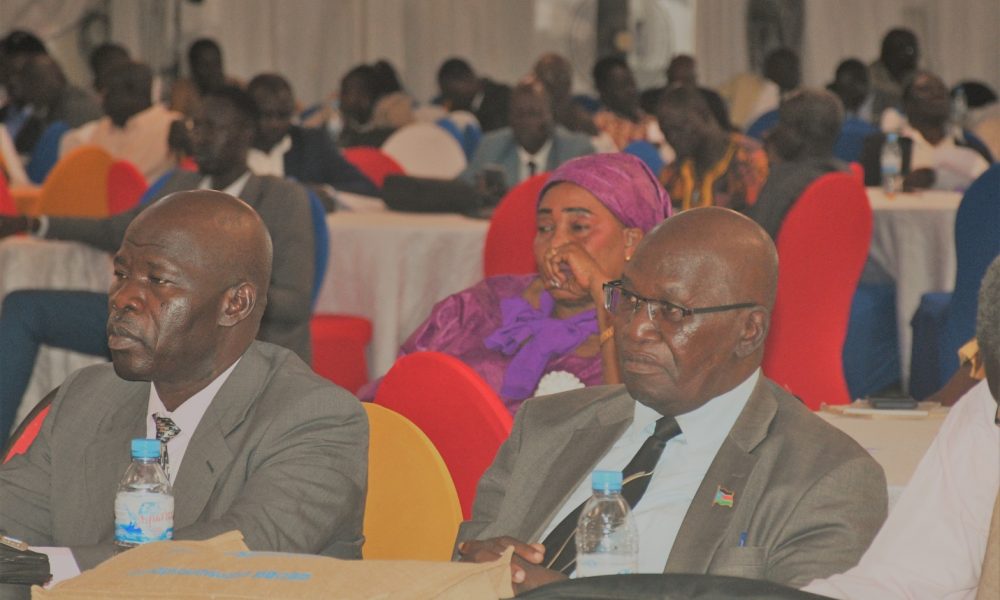By Bida Elly David
Lawmakers are concerned over inactiveness of National Anti-Corruption Commission, blaming it for failing to address cases of the vice in the country.
The grumbling aroused during a celebration before passing of the National Anti-Corruption Act 2009 (Amendment Bill) 2023 into the final stage, on Wednesday.
Concerned lawmakers said the independent anti-graft body has failed to exercise its powers to hold public officials accountable for corrupt practices.
Reth Moch Tang, a lawmaker representing Nasir County of Upper Nile, said there has never been any corruption case that the commission has made public.
Quoting President Salva Kiir’s statement, the legislator said that 75 corrupt government officials involved in money embezzlement went scot free.
“In the last parliament, President Kiir himself came to parliament and told us that there are 75 names that have embezzled $ 4.2 billion, and it was the parliament that resolved that,” Reth said.
According to the law maker, citizens are dying of starvation in camps and across the country, while donated funds are being diverted into individual pockets.
He intimated that reports reveal the sale of the country’s oil up to 2027 in advance, saying it would have been the commission’s mandate to beef up where the money has been deposited.
The MP also complained of a clandestine recruitment of parliamentary staff without the knowledge of lawmakers and the public, which he termed as corruption.
“This is part of the corruption that the commission has to take note of. I can’t bring my own people because I am an MP; it has to be put publicly because there are many competent youth jobless out there,” he echoed.
Lawmakers blame top leadership of anti-corruption commission for failure of the system, noting that they are incompetent and corrupt themselves.
The MPs said bringing a corrupt person to lead the anti-corruption commission is a blind philosophy of hiring the wrong person in the right place.
Parliamentarians noted with concern that appointing people with values and good character can shape the image of the anti-corruption commission.
Zacharia Matur, a lawmaker representing Rumbek Centre County, Lake State, in the national assembly, cited the failure of the anti-corruption campaign to produce reports and record keeping.
“We do not know anything in our country in terms of corruption. There has never been a comprehensive report by the commission on the cases of corruption across the country,” Matur noted.
He said, “We are not seeing the Anti-Corruption Commission helping the people of South Sudan fight corruption, and this is because they complained they did not have teeth.”
Matur urged the commission to sharpen its tools to deal with corrupt public officials, especially with the newly amended bill passed into law while waiting for the president’s assent.
“We want to see that they are biting people who are corrupt in our country. We want to see people put in jail or punished because of corruption,” Matur echoed.
“We understand there are problems in fighting corruption, but they should be joining this house in a fight against corruption. I urge the commissioner this time around to see corruption cases handled very strictly,” he continued.
The MP emphasized the independence of the commission and urged the entity to freely carry out its activities without fear or favor, despite being formed by the president.
“They said no corrupt official is above the law, thus all are subject to trial in cases of malpractice by the body,” he added.
But in December 2022, the Anti-Corruption Commission (SSAC) decried scarce funds and a weaker legal framework as some of the main factors that frustrate the battle against corruption in the country.
The Commissioner of the South Sudan Anti-Corruption Commission (SSAC), Christina Henry Jada, highlighted that the anti-graft commission faces multiple challenges, such as inadequate funds, and needs urgent enactment of legislation to enable them to perform their mandates.
“The main challenges obstructing the whole of SSAC are fundamentally structural and of operational nature; these are represented in the commission’s long-standing inadequate legal framework, as we know that the 2009 Act is very shallow; it doesn’t give or allow SSAC to fight corruption widely,” said MS. Christina.
“Although the constitution has given the commission prosecutorial power, this has yet to be enacted into law. The establishment of the 2009 Act of the Commission has a limited scope for effectively combating corruption,” she continued.
Christina lamented that the absence of funds has impeded the activities of the commission.
Last year, the rented premises housing the national anti-corruption offices were shut down by the landlord for not paying accrued rent arrears.




